European press sceptical of UK-Polish Brexit pact
- Published
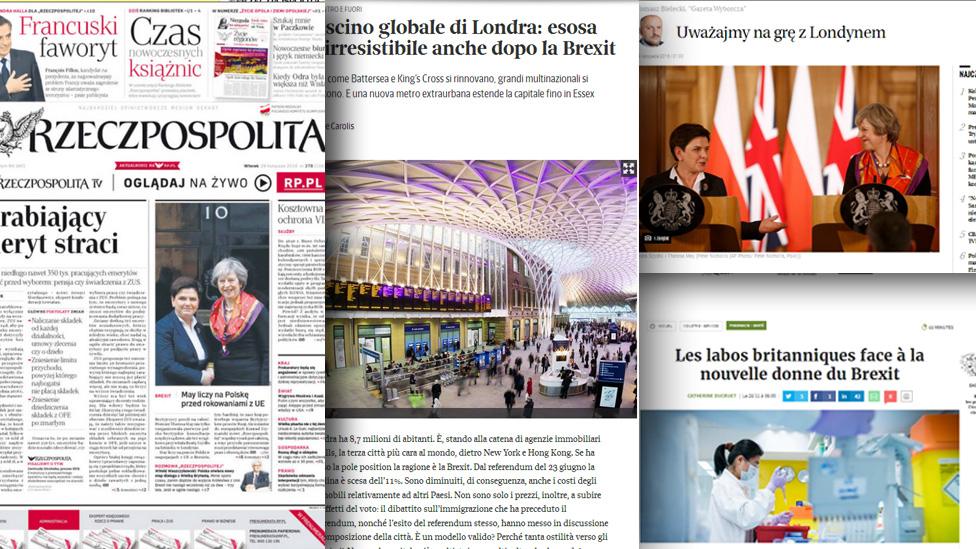
European newspapers mull UK-Poland cooperation prospects post-Brexit
European newspapers are sceptical about prospects of an alliance with Poland to soften the terms of Britain's departure from the European Union.
Other correspondents investigate reports of companies relocating from London to Europe.
'Tightrope act'
The high-profile visit to Britain of Polish Prime Minister Beata Szydlo for bilateral talks on security and the European Union is a matter of pride to some commentators back home.
Popular tabloid Fakt, external is "surprised" at talk of an Anglo-Polish alliance, but has "great expectations for the relationship, not least because Britain sees in us a worthy partner".
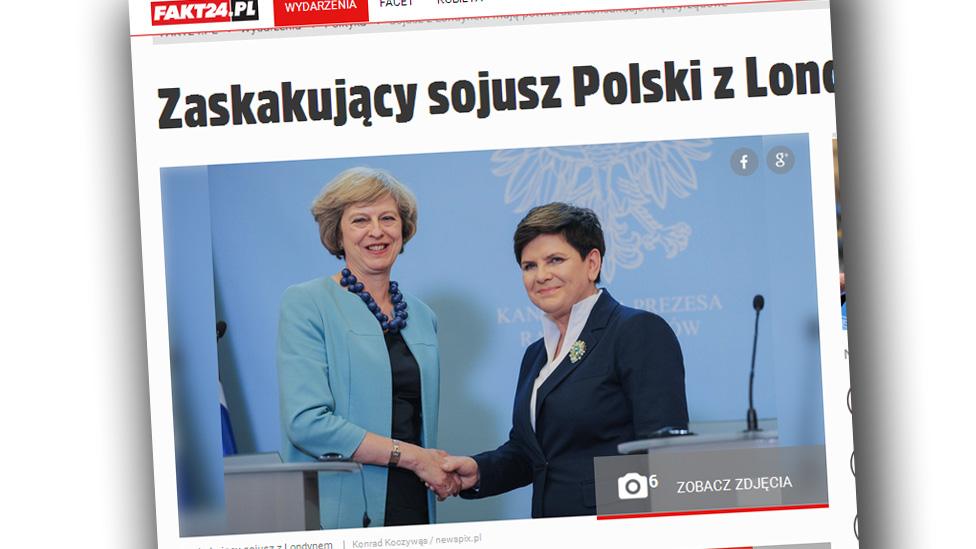
Fakt: "A surprising alliance between Poland and London"
The press welcomes cooperation in facing down any threats from Russia, but fears Britain may try to use Poland to split the EU.
Gazeta Wyborcza, external's Brussels correspondent Tomasz Bielecki acknowledges the "strategic interest" of working closely in Nato and post-Brexit Europe, but warns Poland is "walking a tightrope" given Britain's aim of "upsetting European unity on Brexit and playing member states off against each other".
In Dzennik Polski, external, Zbigniew Parafianowicz and Michal Potocki say an alliance "sounds like a good idea, except it will only last the three years that Britain remains in the EU and London hasn't supplied many actual bricks to support this rhetorical partnership framework".
"The fact is that nobody will agree to easy Brexit terms that might tomorrow run the risk of encouraging Austria, the Netherlands and France to leave the EU," they conclude.
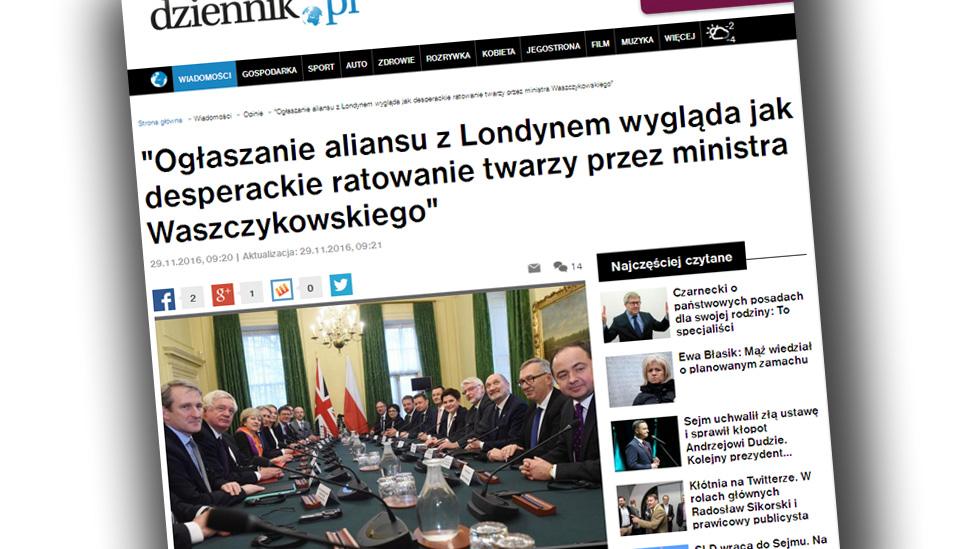
Dzennik Polski: Easy Brexit terms unlikely
Rzeczpospolita, external's London correspondent Jedrzej Bielecki thinks Mrs May "wants to trade Nato military support for Polish help in achieving good Brexit conditions".
He says Poland has little influence over other member states, and France wants a "punitive Brexit to counter nationalist populism, not least its own National Front" in an election year.
Rzeczpospolita commentator Jerzy Haszczynski, external notes that the London talks fell on the "grim anniversary" of the 1943 Tehran Conference, at which Winston Churchill "sold Poland to the Soviets".
"I hope we don't sell the European Union just so the British can live well after Brexit," he concludes.
'Democratic regression'
Comment elsewhere echoed similar concerns that Poland might find itself being used.
But Andras Kosa in Hungary's Magyar Nemzet, external wonders whether a "London-Warsaw-Budapest troika is being formed", as Mrs Szydlo's visit came shortly after Hungarian Prime Minister Viktor Orban had talks with Theresa May, and all three "prefer a European Union based on free trade with decisions taken by the member states".
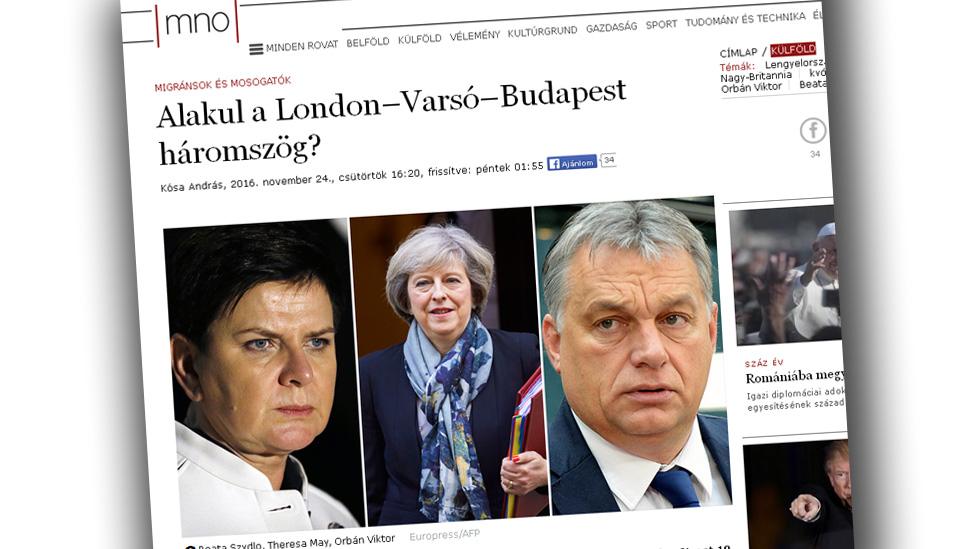
Hungary's Magyar Nemzet: "London-Warsaw-Budapest troika?"
French political scientist Dominique Moisi fears that "Europe, democracy and capitalism are no longer the stuff of dreams for Central Europeans".
A "chilly introspection" in Eastern Europe has followed the migrant crisis, he writes in Les Echos, external, even though the region is economically dependent on the EU and too weak to face Russia alone.
Mr Moisi warns that Western Europe could also go down the road of "democratic regression". "Sometimes those who look behind the times are actually ahead of the pack," he concludes.
'Farewell on the instalment plan'
A broader theme in European papers is the possible exodus of businesses from Britain, and the chances other countries have of hosting them.
The French business paper Les Echos, external highlights the efforts of healthcare companies in the Ile-de-France region around Paris to persuade foreign investors in South Korea, New York and Boston to "move from London because of Brexit".

Les Echos: Healthcare companies urge investors to move from London
But the same paper's Catherine Ducruet sees little sign of pharmaceutical giants, external leaving Britain, especially as the government's corporation tax sweeteners, £2bn investment pledge and the fall in sterling "make the medicine go down" for the time being.
Marcus Theurer of Germany's Frankfurter Allgemeine Zeitung, external looks at the "explosive row" over Bank of England Governor Mark Carney's suggestion of a longer transitional period before Brexit.
Dubbing it "farewell on the instalment plan", Mr Theurer says the City of London wants a longer transition to help businesses postpone and perhaps even drop plans to move from London.
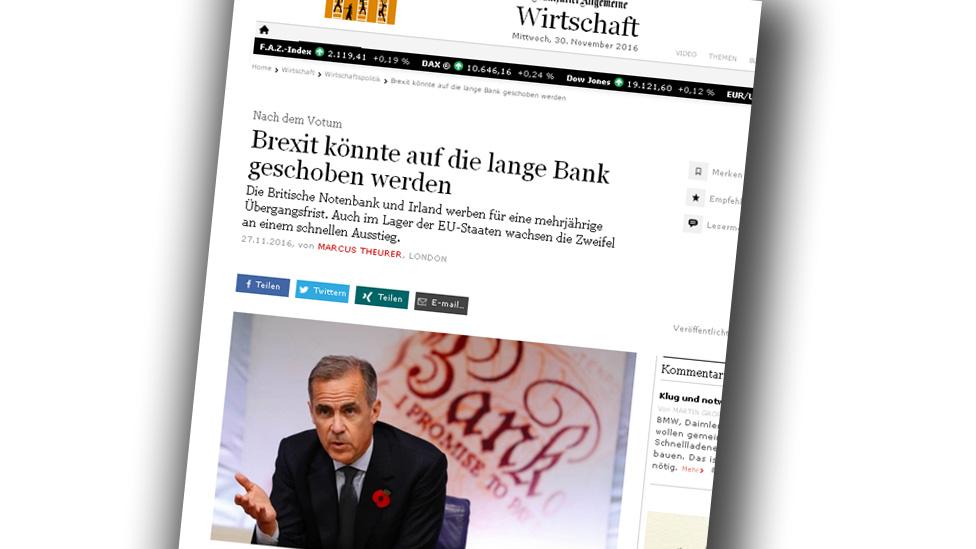
Frankfurter Allgemeine Zeitung comments on London's apparent desire to prevent businesses leaving the city after Brexit
'No exodus'
Munich's Sueddeutsche Zeitung, external reports a campaign by Berlin to replace London as Europe's start-up capital.
Stefan Franzke of the Berlin Partner investment agency is making a "hard sell" to businesses alarmed at the EU referendum, saying one company has already moved from London and another 40 have made "specific inquiries" since June.
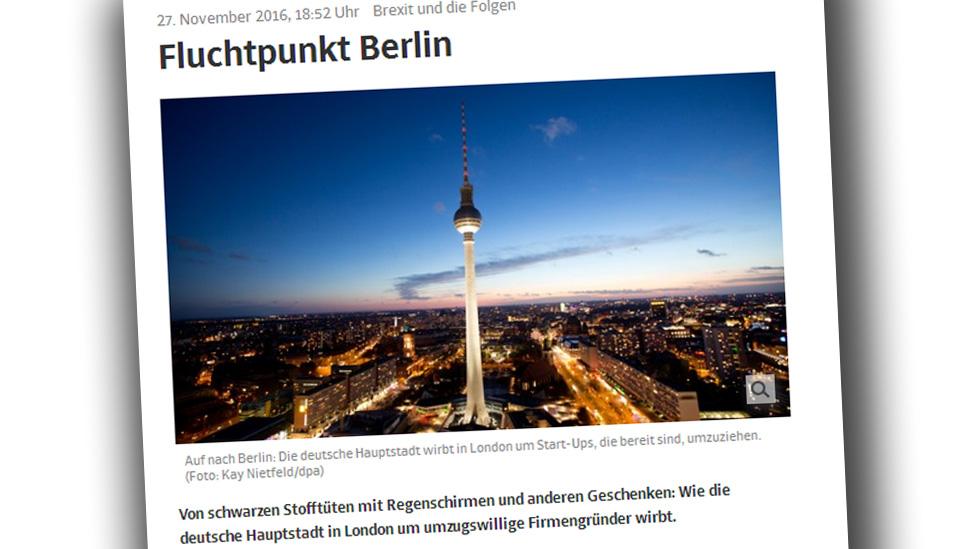
Sueddeutsche Zeitung: "Berlin attracts start-ups ready to leave London"
Apart from the uncertainty, Mr Franzke says start-ups worry that their "dependence on foreign specialists" will fall foul of British plans for tighter migrant controls.
He dismissed the rival claims of Paris, and Le Monde, external's Isabelle Rey-Lefebvre is inclined to agree. She sees "no mass business exodus from London to Paris", despite competitive property prices.
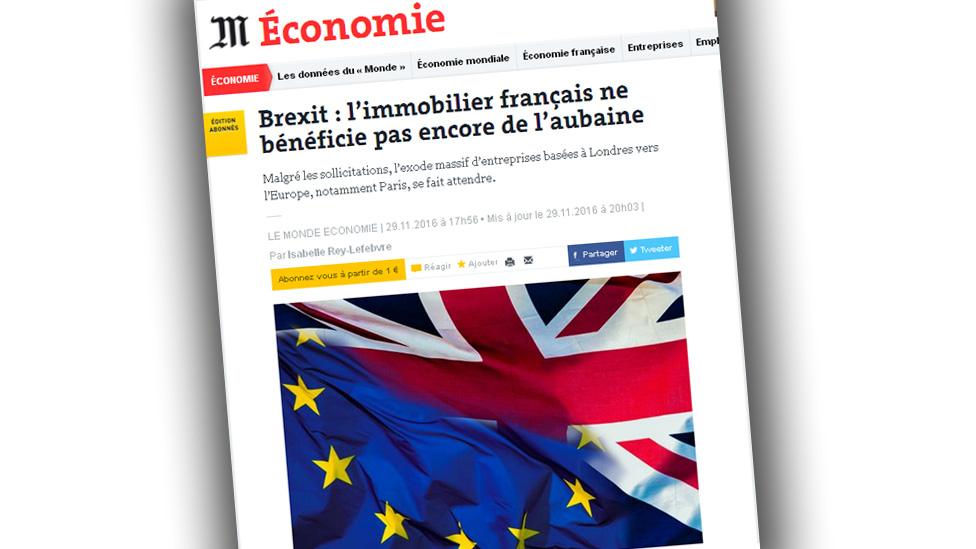
Le Monde: "French property market sees no Brexit windfall"
Paola De Carolis of Italy's Corriere della Sera, external also thinks that London retains its "irresistible global appeal".
She does not play down concerns over the "international tribe that powers the City", but says "there are positive signs as the rest of the city continues to grow and investment continues".
BBC Monitoring reports and analyses news from TV, radio, web and print media around the world. You can follow BBC Monitoring on Twitter, external and Facebook, external.